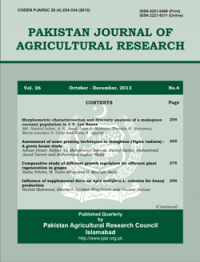Relative Performance of Promising Chickpea (Cicer arientinum L.) Lines under Drought Stress Milieu
Relative Performance of Promising Chickpea (Cicer arientinum L.) Lines under Drought Stress Milieu
Muhammad Akhtar1, Muhammad Tariq Mahmood2*, Kaiser Latif Cheema1, Mushtaq Ahmad2, Muhammad Jahanzaib Khalid1, Amir Amin1, Javed Anwar Shah1, Zeeshan Qadeer1 and Zeshan Ali3
ABSTRACT
Sustained drought, uneven rain falls, progressively depleting soil moisture and predominant cultivation of chickpea under residual soil moisture condition are major causes of drastic decline in chickpea productivity in Pakistan. Systematic breeding efforts are required for evaluation of available genetic material to evolve drought tolerant chickpea cultivars for drought prone regions of the country. For this purpose, a research experiment was conducted in moisture stress (drought) and non-stress conditions (irrigated) at Gram Breeding Research Station, Kallurkot, Pakistan during 2019-20. Mean performance of various traits revealed significant differences among all the included chickpea advance lines. Drought indices i.e. drought tolerance efficiency (DTE), drought susceptibility (DSI) and yield reduction percentage were calculated to identify the drought tolerant chickpea lines. Correlation analysis showed that the strains possessing higher number of pods plant-1, more root length and maximum grain weight were comparatively least susceptible to moisture stress along with higher yield potential. Results regarding drought indices also indicated that relatively higher DTE, less DSI and minimum yield reduction percentage were revealed by KK-10001, KK-10015, KK-10019 and Bhakkar-2011. Therefore, these advance lines possess best genetic constitution for moisture stress tolerance and may be utilized further for chickpea genetic improvement program.
To share on other social networks, click on any share button. What are these?






